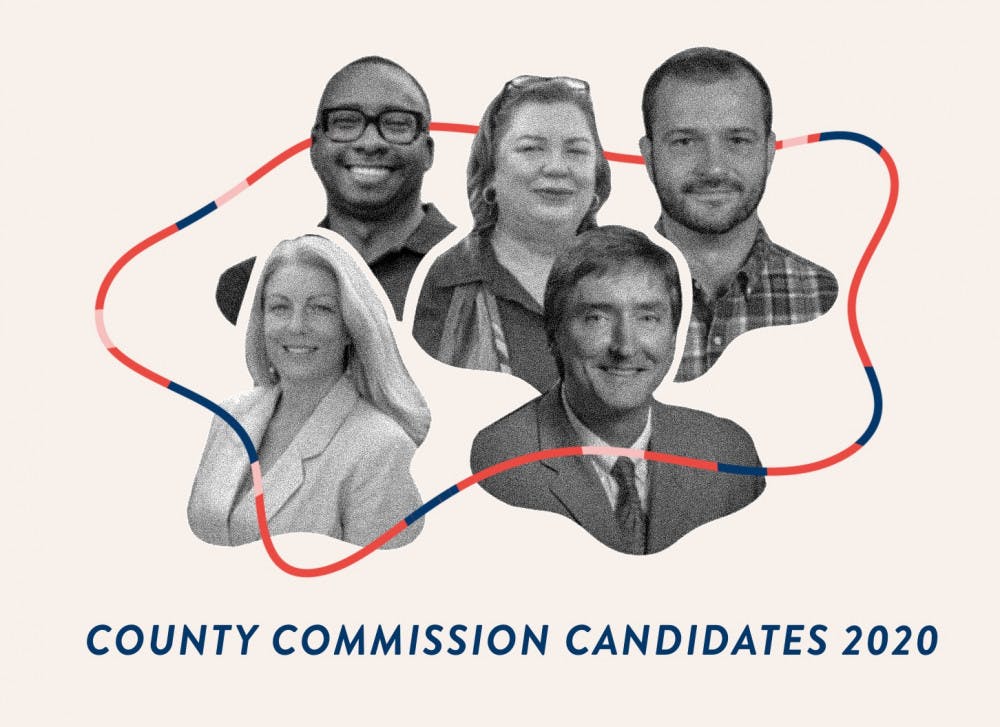Editor’s Note: The Alligator didn’t cover the candidacy of Raemi Eagle-Glenn for District 1 and Joy Glanzer for District 3 because the positions are uncontested for the Republican party. The candidacy of Democrat Charles S. Chestnut IV for District 5 is also uncontested. These races will not appear on the Aug. 18 ballot.
District 1: Democratic Candidates
Mary Alford, 59
Environmental Engineer
Who is Mary Alford?
-
Former president of local chapter of U.S. Green Building Council
-
Born and raised in Alachua County
-
Served on the Alachua County Environmental Protection Advisory Committee
-
Bachelor's degree in environmental engineering from UF, Master’s degree in engineering from UF
Campaign Finances
Monetary contributions: $24,953.96
Total spending: $20,136.02
All information from Voter Focus, as of Sunday
What is Alford’s previous experience?
During her career as an engineer, Alford said she has worked in utilities management and environmental engineering. Over the last 10 years, she said she began getting involved in local politics.
Since then, Alford said she has worked with many nonprofit and governmental committees and boards, including the Alachua County Environmental Protection Advisory Committee, Gainesville’s Utility Advisory Board and the Alachua County chapter of the NAACP’s Environmental and Climate Justice Committee.
Alford told The Alligator she became involved in local politics after she lost a child to leukemia. She said he didn’t have access to health care.
“That journey made me more focused on what I could do in the community to make things better,” Alford said.
With concerns about racial inequity growing, how would Alford address these concerns locally?
The county should conduct a study to uncover inequity in hiring, service distribution and contracts to local businesses, Alford said.
Alford said she would follow the lead of Gainesville City Commissioner Gail Johnson, who pushed for a race and equity study of the city government that found that few government contracts went to women or people of color.
After inequities are uncovered, Alford said she would implement policies to target the specific problems found. To Alford, creating policies to hold government officials accountable does more to address inequity than talking about inclusivity.
What are some ideas Alford has, if elected?
If elected, Alford said she would focus on equitable environmental sustainability. While she said she recognized the county’s previous environmental decisions were beneficial, she told The Alligator she doesn’t believe some of them were equitable.
She pointed to the 2019 expansion of a landfill in southeast Gainesville. She said the commission didn’t discuss the effect of the landfill’s expansion on the prices of property in a predominantly minority community.
Alford said she would advocate against the development of a new county administration complex to instead use the money to fund road repairs in the county. The county budgeted $3 million this year to design the building, Alford said
Mike Byerly, 56
Current Alachua County Commissioner
Who is Mike Byerly?
-
Moved to Alachua County during high school
-
First elected to the Alachua County Commission in 2000
-
Bachelor's degree in zoology from Clemson University, Bachelor's degree in journalism from University of Georgia
Campaign Finances
Monetary contributions: $14,975
Total spending: $5,886.77
All information from Voter Focus, as of Sunday
What are highlights of Mike Byerly’s previous terms?
Byerly said he has focused most of his time as commissioner on developing the county’s growth management plan, which outlines where the county should increase development and improve transportation resources.
Environmental issues influenced Byerly’s start in politics, he told The Alligator. Byerly said he pushed to extend the county's land conservation efforts and supported the county’s open space protection requirement, which requires developers to save at least 10 percent of land they develop for an open, preserved outdoor space.
With concerns about racial inequity growing, how would Byerly address these concerns locally?
To address racial inequity concerns, the county should hire a new equity director, Byerly said. The director would examine the county’s history to determine how previous government action has impacted minority groups, he added.
While he said he wasn’t calling for drastic cuts to the Alachua County Sheriff’s Office budget, he said he would contain its growth to increase funding for programs for the county’s low income residents, which, he said, are disproportionately people of color.
Byerly said he has also worked to examine ACSO’s policies. He mentioned a meeting where commissioners discussed ACSO’s community outreach programs and use of force procedures with Sheriff Sadie Darnell.
What are some ideas Byerly has, if reelected?
If reelected, Byerly said his primary focus would be dealing with the aftermath of the COVID-19 pandemic. He told The Alligator that the commission will operate on a reduced budget because of decreased tax revenue.
To Byerly, the commission needs to prepare for another disaster that can pose a greater threat than the pandemic: climate change. Byerly said climate change can’t be ignored, even if it may not seem as severe as COVID-19.
Byerly said he worked on climate change-related initiatives, such as the wetland protection code. He said the commission needs to do more to reduce the effect of climate change in the county.
District 3: Democratic Candidates
Anna Prizzia, 43
Director of UF Field and Fork Program
Who is Anna Prizzia?
-
From Northern Virginia
-
Founder of Working Food
-
Bachelor's degree in marine biology from UNC Wilmington, Master’s degree in wildlife ecology and conservation from UF
-
Served in Vanuatu through the Peace Corps
Campaign Finances
Monetary contributions: $38,363.98
Total spending: $31,314.59
All information from Voter Focus, as of Sunday
What is Prizzia’s previous experience?
As director of UF’s Field and Fork program, Prizzia said she learned about contracting, budgeting and communications. She added that her position helped her learn how to navigate bureaucracy to make positive changes.
Prizzia told The Alligator she has worked on local issues, such as food access and affordable housing, through her nonprofit Working Food. She said Working Food connects local farmers with businesses while also advocating for healthier food for economically disadvantaged residents.
With concerns about racial inequity growing, how would Prizzia address these concerns locally?
Prizzia said she would examine the contracts that the county has with local businesses to ensure equitable opportunities are provided to businesses owned by women and people of color. She said she would aim for all county employees to receive livable wages.
To Prizzia, the county needs to make changes to the criminal justice system. She added that she would increase the impact of ACSO’s current diversion efforts, like its mental health co-responder program, which pairs deputies with mental health professionals when responding to calls that may be related to mental health. Prizzia also said she would focus on demilitarizing ACSO.
What are some ideas Prizzia has, if elected?
If elected, Prizzia said she would encourage the county to create a unified intake center that would provide an alternative to jail for residents who are struggling with substance abuse or mental health issues, Prizzia said. She added that the center should be staffed with social workers, therapists and support services.
Prizzia also said the county should start a community development finance institution, adding that it would operate as a bank that could provide financing to community members who don’t usually qualify for credit. She said the institution could provide funding for affordable housing programs that developers haven’t invested in because they offer smaller profit than building luxury student housing.
Jason Stanford, 44
Teacher at Alachua County Public Schools
Who is Jason Stanford?
-
Born and raised in Alachua County
-
Worked in program and project management for the Centers for Disease Control and Prevention and U.S. Department of Health and Human Services
-
Teaches at Hawthorne Middle/High School
-
Bachelor's degree in sociology from UF, Master’s degree in public administration from Georgia State University
-
Former president of the Stonewall Democrats of Alachua County
Campaign Finances
Monetary contributions: $12,715.30
Total spending: $10,448.72
All information from Voter Focus, as of Sunday
What is Stanford’s previous experience?
While at the CDC and HHS, Stanford said he worked at local, state and federal levels to increase HIV prevention and improve access to health care for HIV-positive patients. He also worked with local governments to develop response plans to natural disasters and pandemics from a public health perspective.
Stanford said he can draw on his experiences to help the county govern during the COVID-19 pandemic.
Through working for the federal government, Stanford said he also has experience awarding federal grants to local governments, where he noticed how counties increased their tax revenue. To Stanford, successful small cities at the edge of counties can attract business from neighboring counties, which brings more resources to the county.
With concerns about racial inequity growing, how would Stanford address these concerns locally?
Stanford said his time as a public servant in health care and as a teacher exposed him to racial inequity.
When working with HIV patients, he said that he noticed most people of color didn’t have the same access to medical resources as white people. As an ACPS teacher, he said he sees how school funding isn’t equal between Black and white communities.
To respond to inequity, he said he would ensure minority communities have equitable access to COVID-19 testing and other resources necessary to combat the pandemic. He also said he would advocate for more equitable funding for schools all over the county.
What are some ideas Stanford has, if elected?
If elected, Stanford said he would use his public health experience to develop a long-term plan to deal with the COVID-19 pandemic. He said he hasn’t seen the county develop any similar proposals so far.
The plan would target at-risk communities and outbreak hot spots, work out the distribution plan for a potential vaccine and outline what funding and supplies to request from the federal government, he said. To Stanford, a long-term plan would build community trust, which helps in the fight against COVID-19.
Kevin Thorpe, 46
Senior Pastor of Faith Missionary Baptist Church
Who is Kevin Thorpe?
-
Born and raised in Jacksonville
-
Alachua County resident since 2001
-
Pastor in Gainesville since 1998
-
Owns and operates The Captain’s Closet, a custom clothing company that sells suits, blouses and dress shirts
-
Bachelor’s degree in pastoral ministries from Conservative Theological Seminary, Master’s degree in pastoral ministries from Conservative Theological University
Campaign Finances
Monetary contributions: $71,510
Total spending: $43,107.55
All information from Voter Focus, as of Sunday
What is Thorpe’s previous experience?
Thorpe said he began involving himself in the community a year after becoming a county resident. Since then, he said he has served on 21 different nonprofit and government boards, including the local chapter of Habitat for Humanity and the local chapter of the African American Accountability Alliance.
He’s now the co-chair of North Central Florida Foundation for Affordable Housing.
With concerns about racial inequity growing, how would Thorpe address these concerns locally?
The county commission must partner with local law enforcement as well as the community in the most disproportionate contact with it, the Black community, Thorpe said.
The county government must include citizens in the conversation, Thorpe said, adding that policing policies need to be reviewed by the county commission. He said the commission should also help advocate for criminal justice reform at the state and federal levels.
What are some ideas Thorpe has, if elected?
If elected, Thorpe said he would work to improve the county’s workforce. Some commuters drive 45 minutes to an hour every day, Thorpe said. These commutes wear down county roads, congest traffic and hurt the environment, he added.
Thorpe said he would focus on hiring residents locally to decrease the stress on county infrastructure as well as unemployment. He also said he would focus on developing affordable housing, especially so that residents have access to affordable rent and home ownership
(Top from left to right) Kevin Thorpe, Mary Alford, Jason Stanford. (Bottom from left to right) Anna Prizzia, Mike Byerly






